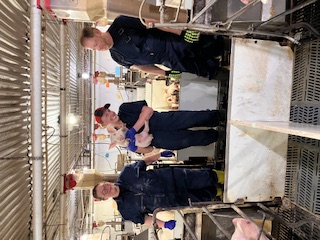Division of Research & Innovation
Preventing Infection-related Lameness in Sows
The Jennings Lab works to promote healing and reduce infections in pig production
Sows in commercial pork production facilities are often prone to lamentable health conditions related to pregnancy and immobility during farrowing. One common occurrence is infection in cracked and overgrown skin on the hooves, also known as “bushfoot.” Unsuccessful treatment of these conditions can lead to osteoarthritis, lesions, and osteochondrosis, among other ailments. If left to progress, these pressure sores and other superficial injuries such as leg ulcers may lead to the sow’s inability to bear weight on the affected limb or limbs or lameness. Sow lameness can be a major cause of economic loss for pig producers. The current standard of care treatment of foot lesions depends on early recognition and aggressive antibiotic therapy and analgesics (non-steroidal anti-inflammatory drugs) to improve comfort and welfare. In severe cases, an affected sow must be removed from the competitive healthy group and placed in an isolated hospital area. If these measures are unsuccessful, humane euthanasia is recommended. In addition, lesions on the foot and hock can stifle post-partum milk production during the lactation period, creating an avenue for infection and compromising milk production and subsequent weight gain of piglets.
The Jennings lab is working with Chitozan Health, LLC, and the Comhar group to evaluate thermogelling “liquid bandages” that contain silver and chitosan to promote healing and minimize infection. The materials developed in this project could serve as a platform technology for treatment of wounds in other animals and humans. With our approach, antibiotics are not used, meaning there is therefore a lower likelihood of promoting antimicrobial resistance and a lower amount of antibiotics and harmful chemical waste in the food supply, water, and soil. This project will also support and enable graduate and undergraduate students in biomedical engineering and related fields to become involved in agricultural and conservation research, and present findings at conferences. Overall, this project has the potential to innovate in both biomedical and agricultural practices by introducing sustainable treatments that enhance animal health, reduce reliance on antibiotics, and mitigate the risk of antimicrobial resistance. This interdisciplinary project could lead to significant advancements in wound care, animal welfare, and broader applications in human health.
For more information on this research, contact Dr. Amber Jennings, associate professor of biomedical engineering, at jjnnings@memphis.edu.

